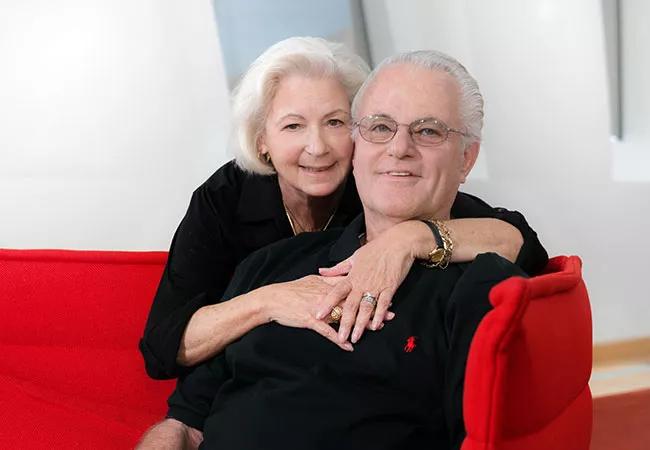
Image content: This image is available to view online.
View image online (https://assets.clevelandclinic.org/transform/60b35845-fb92-492c-aee4-c071dee85291/15-GER-3028-CaseStudy-650x450_jpg)
15-GER-3028-CaseStudy-650×450
An initial conversation with Harvey and Jane Levy reveals little about the fact that Mr. Levy, 71, is battling Alzheimer disease. Both husband and wife have a good sense of humor and an obvious love of life. After nearly 50 years together, Mr. Levy’s diagnosis is one of the biggest challenges they’ve had to face. When Mr. Levy, a retired electrical contractor in Los Angeles, was diagnosed five years ago, they turned to Cleveland Clinic Lou Ruvo Center for Brain Health in Las Vegas.
Advertisement
Cleveland Clinic is a non-profit academic medical center. Advertising on our site helps support our mission. We do not endorse non-Cleveland Clinic products or services. Policy
“The disease affects everybody differently. With Harvey, it’s unfortunately his speech,” says Mrs. Levy. “He knows what he wants to say, but he can’t always get it out.”

Image content: This image is available to view online.
View image online (https://assets.clevelandclinic.org/transform/d017fdf2-c7b4-4905-9307-e98acce3f168/15-GER-3028-CaseStudy-Inset_jpg)
Today, numerous clinical trials are underway to help patients like Mr. Levy. He is currently participating in the NOBLE study at the Lou Ruvo Center for Brain Health, coordinated by the Alzheimer’s Disease Cooperative Study. This study is evaluating an investigational oral drug for patients with mild to moderate Alzheimer disease. The study includes 450 patients at research sites across the country. Total participation time is about 14 months, during which Mr. Levy is being carefully monitored. Studies have shown that this investigational drug may work by protecting brain cells, which could result in slowing the progress of the memory loss.
Clinical research coordinator Yolande Mucharbach at the Lou Ruvo Center for Brain Health says clinicians speak with patients and caregivers about clinical trials and encourage them to think about participating if they are eligible.
“It’s people like Harvey and Jane Levy and others in the study who are paving the way to find a new treatment for Alzheimer disease,” she says.
At the Lou Ruvo Center for Brain Health, there are weekly caregiver support groups available to help family members of individuals with Alzheimer disease in dealing with the significant changes their loved ones face. Led by a psychologist, the meetings are confidential, free and open to the community. Meetings are structured so members can share their experiences with others and exchange ideas and resources for coping with challenging situations that may arise in their role as care partners.
Advertisement
Mrs. Levy says the group meetings provide a safe and nonjudgmental place. Thanks to the group, she says she has made friends with other people who understand what she’s going through.
“We met this fabulous couple, and we go out with them all the time,” she says. “Her husband has trouble with short-term memory, and Harvey has trouble with speech, but we get along great.”
Mrs. Levy also has weekly lunch date with some of the women from the group.
Other programs and classes at the center are designed to keep patients engaged in life. For the past year, the Levys have been attending an art class where they learn about various pieces of art. Now, they’re signed up for another art class in which they’ll be creating the art.
“Cleveland Clinic has been a godsend for us on so many levels,” Mrs. Levy says. “The support, the interaction and the hope that it might actually work make it well worth it.”
And Mrs. Levy goes on to say that she and Mr. Levy have three sons who could potentially inherit the disease. The couple wants to do everything it can to further research and help others.
Learn more about AD clinical trials .
Advertisement
Advertisement
Pilot study confirms feasibility of conducting additional research on the novel treatment
Longer hospitalization does not mean a safer, faster recovery for patients age 70+
Structured data helps identify older adults at risk for poor outcomes, defines patients who require more comprehensive assessments
Self-administered tool can be completed in 10 minutes in waiting room
Social prescribing turns leisure activities into good “medicine”
A large geriatric study aims to find the answers
Analysis underscores how telehealth can help pinpoint elder abuse